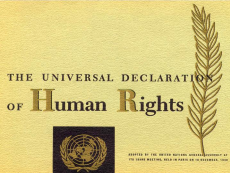
Email: ZYVC057@live.rhul.ac.uk
Total Article : 213
About Me:I'm a graduate student studying International Criminal Law and first started writing for King's News almost 4 years ago! My hobbies include reading, travelling and charity work. I cover many categories but my favourite articles to write are about mysteries of the ancient world, interesting places to visit, the Italian language and animals!

Throughout history groups of individuals have sought to provide valid systems of justice that set out to protect the rights of citizens. After years and years of injustices without prosecution, in Paris on December 10th 1948 the General Assembly of the United Nations chose to adopt a binding collection of laws based on respecting the basic principles of human rights. Thus, the Universal Declaration of Human Rights was born and many consider it to be the first legal document which evokes universal human rights laws to be implemented worldwide to protect civilians. Most legal documents can appear to be extremely complicated, tediously long and perpetually frustrating, but here at King’s News we aim to provide you with a simplified version of the first ten articles of the Universal Declaration of Human Rights! So forget about complicated laws and misleading phrases, this is a general breakdown of what the articles mean and how they are enforced. After, it’s then up to you to decide whether they are respected or not. So on that note let the articles begin!
Article 1:
‘All human beings are born free and equal in dignity and rights. They are endowed with reason and conscience and should act towards one another in a spirit of brotherhood.’
The first article of the document says that each individual person is born with the same rights as everyone else. We can call think by ourselves, reason, and tell the difference between right and wrong and we should all cooperate together.
Article 2:
‘Everyone is entitled to all the rights and freedoms set forth in this Declaration, without distinction of any kind, such as race, colour, sex, language, religion, political or other opinion, national or social origin, property, birth or other status. Furthermore, no distinction shall be made on the basis of the political, jurisdictional or international status of the country or territory to which a person belongs, whether it be independent, trust, non-self-governing or under any other limitation of sovereignty.’
Each of us has the rights discussed in article one no matter our race, colour, sex, language, religion, political choice or other opinions, our nationality, birth or other status. Also, we shall not be discriminated against based on the country we are from. This article reinforces the first article as it eliminates any space for discrimination. Whereas in George Orwell’s brilliant book ‘Animal Farm’ the sheep changed the law from ‘all animals are equal’ to ‘all animals are equal but some are more equal than others’, article two of the Universal Declaration of Human Rights makes sure this can never happen by stating that we cannot discriminate people from their basic rights for any reason.
Article 3:
‘Everyone has the right to life, liberty and security of person.’
Everyone has the right to live, be free and have a sense of safety. This article lays out fundamental human rights.
Article 4:
‘No one shall be held in slavery or servitude; slavery and the slave trade shall be prohibited in all their forms.’
This article prohibits slavery. Nobody should be a slave nor make someone else their own slave. At the time this was a well-thought modernist approach to ending slavery, endorsed by Western countries. Although unfortunately the slave trade is still an active industry in some parts of the world, this article has removed it from ever being lawful and identifies it as an act of crime worthy of prosecution.
Article 5:
‘No one shall be subjected to torture or to cruel, inhuman or degrading treatment or punishment.’
The fifth article condemns the use of torture or any other vile and violent punishments imposed on individuals.
As you can see, the first five articles in the Universal Declaration of Human Rights outline our basic rights and freedoms as citizens of the world; they remove our nationality, race, gender etc. and consider us purely as humans that deserve to be respected. Having said that, many sections of this legal document have been breached over time and still are being broken today. Can you think of any examples in which one of these five articles have been ignored? For example, a case in which torture has been used and condoned or citizens have no longer been considered equal in dignity and rights based on their race. Were these cases punished after? Why not carry out your own research and let us know what you discover by commenting below – good luck!
*This article focuses on the first five articles; feel free to read more of them at http://www.un.org/en/documents/udhr/
Image: http://www.cicd-volunteerinafrica.org/images/subjects/TheUniversalDeclarationOfHumanRights.jpg

0 Comment:
Be the first one to comment on this article.